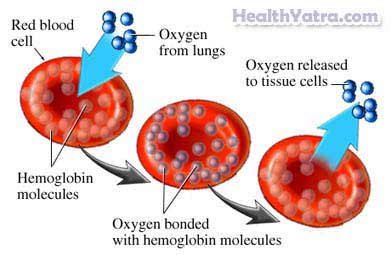Thalassemia Treatment in India
Thalassemia is a blood disorder. It cuts down the amount of red blood cells and hemoglobin that the body can make. Red blood cells carry oxygen to all the organs in the body. Hemoglobin is a part of red blood cells that helps grab oxygen at the lungs. Low levels of red blood cells and hemoglobin can lead to anemia. Anemia is low level of oxygen in the body that interferes with normal bodily functions.

Thalassemias are split into two main categories. The categories are based on the part of hemoglobin that is affected:
- Alpha thalassemia—based on the alpha part of hemoglobin
- Beta thalassemia—based on the beta part of hemoglobin
أسباب
Thalassemia is caused by faults in specific genes. It is an inherited disorder. This means the affected person received the faulty genes from the parents. The severity of the thalassemia will depend on the number of faulty genes that a child inherits. There are four genes needed for hemoglobin, two from each parent. The number of genes that are faulty will determine the severity and subtype of thalassemia:
- In alpha thalassemia
- One abnormal gene—silent carrier, no signs of illness but can pass condition on to child
- Two abnormal genes—Thalassemia trait, may have mild anemia
- Three abnormal genes—Hemoglobin H disease, moderate to severe anemia
- Four abnormal genes—most severe form called Alpha hydrops fetalis, results in fetal or newborn death
- In beta thalassemia
- One abnormal gene—Thalassemia minor, carrier with mild anemia
- Two abnormal genes—Thalassemia major (Cooley’s anemia), may have moderate to severe anemia
عوامل الخطر
Factors that increase your chance of Thalassemia include:
- Certain types of thalassemia are associated with ancestors from certain parts of the world:
- Alpha thalassemias—Southeast Asia, Malaysia, and Southern China
- Alpha hydrops fetalis—Southeast Asian, Chinese, and Filipino ancestry
- Beta thalassemias—Africa, areas surrounding the Mediterranean Sea, and Southeast Asia
- A family history of the disorder
الأعراض
Silent carriers will have no symptoms. For others, symptoms most often begin within 3-6 months of birth.
Symptoms of mild or moderate anemia may include:
- Feeling weak and tired
- ضيق في التنفس
- Dizziness or headaches
- Cold hands and feet
- جلد شاحب
Symptoms of severe anemia include:
- Lack of interest in activity
- Pale appearance
- ضعف الشهية
- البول الداكن
- اليرقان
General symptoms of thalassemia include:
- Slow growth and delayed puberty
- Enlarged and fragile bones, including:
- Thickening and roughening of facial bones
- Bones that break easily
- Teeth that don’t line up properly
Thalassemia can also lead to complications such as:
- Increased risk of developing infections
- Enlarged spleen
- سكتة قلبية
- Liver problems
التشخيص
The doctor will ask about your symptoms and medical history. A physical exam will be done. Blood tests will be done to measure levels of:
- Hemoglobin
- Red blood cells
- Iron—needed to build hemoglobin
العلاج
العلاج سيكون على حسب النوع and severity of anemia. Mild forms may not need treatment. More severe forms may need:
نقل الدم
Blood transfusions will help provide healthy new red blood cells. The blood comes from a donor and is carefully screened before it is delivered in a transfusion.
Repeated blood transfusions can lead to high levels of iron in the blood. This can damage the heart, liver, and other vital organs. Certain medications can bind to the iron and carry it out of the body through urine.
زراعة نخاع العظم
Healthy stem cells from a donor’s bone marrow are injected into your vein. The new cells travel through the blood into the bone cavities. There they can produce new blood cells. This may be a cure in some. However, it can be hard to find a good match with a donor.
استئصال الطحال
Thalassemia can cause the spleen to enlarge. An enlarged spleen can make anemia worse. A splenectomy is a عملية جراحية لإزالة the spleen. It may help reduce the number of blood transfusions that are needed.
الصحة العامة
Complications and impact on your daily activities may be reduced by following basic healthy lifestyle tips:
- Eat a well balanced diet. Your doctor may also recommend supplements like folic acid
- Include regular physical activity
- Take steps to prevent cold or flus. Wash your hand often. Avoid crowds in flu season. Get vaccinations as recommended.
- Go to all medical appointments as recommended.
الوقاية
This disease is inherited. Blood tests and family genetic studies will show if you are a carrier. A genetic counselor can discuss the risks of passing on the disease.
